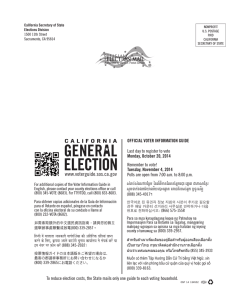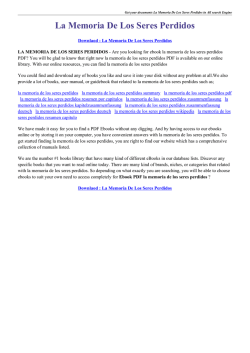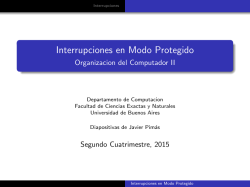
Glossary - Reconstructing Historical Memory
168 Glossary Actor: a person who participates in an event and assumes a particular role in the face of it. Agent: a person or group who acts and whose actions triggered events and decisions by others. Chronology: a sequence of relevant events that are ordered in time. Citizen: the political identity that we assume when we belong to a democratic community that is founded on principles of equality, freedom and solidarity. Today citizenship is understood as a political identity that is expressed both in the public and private sphere, and which is founded on principles of mutual respect, reciprocity, and adhesion to dialogue as the way to handle conflicts, either through promoting consensus or clearly but non violently stating oppositions. The condition of citizenship requires respectful treatment of differences and conflicts. Discrimination: different and unfair treatment of a certain group of people or of an individual based on prejudices such as class, religion, race, gender, age, physical ability, marital status, or sexual orientation. Dissent: ways of acting that express disagreement with a way of seeing the world or conceiving of order. Epic: a tale of people, places and events that tells the story as one of heroes and winning or losing deeds. Exclusion: the political act by which the rules of the game are defined 169 economic or symbolic resources is impeded. Heterogeneous: made up of parts or members that are each different. Human rights: the General Assembly of the United Nations proclaimed the Universal Declaration of Human Rights in 1948 in recognition of the inherent dignity and the equal and inalienable rights of all members of the human family. Human rights are a common ideal whose recognition and universal and effective application should be promoted to peoples as well as nations and Member States in the territories under their jurisdiction. Colombia for example contemplates human rights in the National Constitution, and obliges the State to guarantee them. Title II, Chapter 1, “Fundamental rights” includes the right to life, freedom, equality, privacy, free development of personality, freedom of religion and conscience, honour, labour, academic freedom, due process, public expression, freedom of association, and political participation, among others. Imprint: the mark or trace that one person leaves on another person or event. Impunity: a situation where the State does not apply due process and other procedures as set forth in the law for the exercise of justice, be this due to incapacity, omission or complicity. Individual: the liberal thought that was triumphant in the democratic revolutions of the nineteenth century associated the concept of an individual to one gender, social status and race and transformed this category, not into a universal and inclusive formula, but rather into a mechanism of exclusion and subordination. From this perspective ‘individual’ was not synonymous with ‘human being’, but with a particular sort of person: male, legal, tax payer, property owner and married. Its use then served to exclude women, Afro-descendent and indigenous people, LGBT people, and the dispossessed of the rights associated with full citizenship. Glossary such that the access of certain individuals and groups to political 170 Institution: a social or state organization that responds to formal and informal rules of the game. International Humanitarian Law (IHL): a set of rules that, for humanitarian reasons, tries to limit the effects of armed conflict. It protects people who are not, or are no longer, involved in the fighting, and limits the means and methods of warfare. IHL applies in cases of armed conflict and is required of all actors. Interpretive frameworks: mental templates with which we understand, interpret and classify social and political reality and construct notions of justice and duty. Interpretive frameworks are products of political, social and symbolic relations, and lead to disputes among actors. Legitimacy: attribute of justice or truth that we assign to certain behaviours that we are willing to accept and replicate. In politics legitimacy is understood as a concept designed to assess the quality and type of relationship established between rulers and ruled. Mediators: individuals or groups that mediate and establish bridges between social and political networks so as to influence versions of the past or certain events. Narratives: stories and ways of telling a story that connect and give meaning to a sequence of events, places and people. Polarization: a social process by which group members confront members of another group as enemies, to the point that they end all possibility of reaching agreements and negotiations. Residential schools: “For over a century, generations of Aboriginal children were separated from their parents and raised in overcrowded, underfunded, and often unhealthy residential schools across Canada. They were commonly denied the right to speak their language and told their cultural beliefs were sinful. Some students did not see their parents for years. Others - the victims of scandalously high death rates - never made it back home” (Truth and Reconciliation Commission of Canada, 2012). Rights-bearing subject: social entity or person who can claim and use the rights they are entitled to as citizens and as human beings. Social Order: patterns or regularities in which the relations between individuals and groups are inscribed at a given time, and from which a certain distribution of the economic political and symbolic resources of a society is established. These patterns in the distribution of resources produce hierarchies, inequalities, inclusions and exclusions. These distribution patterns affect public and private spheres (family, domestic, personal). Stigmatize: to define a person or group by a negative characteristic. This characteristic is seen as inherent to their identity. For example, women are sometimes imputed to be emotional and intuitive, characteristics that become stigmatizing when, because they are considered emotional and intuitive they are denied the ability to be rational and able to participate in public debate and in politics. Symbolic representations: figures, images or ideas that individuals and groups build to communicate to others and make sense of their experience and emotions in the face of a set of events. Victim: In Colombia the term victim is legally defined as “a person who individually or collectively has suffered direct damage such as temporary or permanent injury resulting in physical disabilities, mental and/or sensory impairment (visual and/or hearing), emotional suffering, economic loss or impairment of their fundamental rights” as “a result of actions that have violated the criminal code”, as well as such suffered by their immediate family (law 975). The March 14, 2001 Judgment of the Inter-American Court of Human Rights considers that “victims includes both direct victims and their families, without distinction between them or as to the degree of relationship or kinship, at least in regards to the acknowledgement of their status as victims of crime”. 171 172 REFERENCES Angrosino, Michael. 1989. Documents of Interaction. Biography, Autobiography, and Life. History in Social Science Perspective. University of Florida Press, Gainsville. Belenky, M., B. McV. Clinchy, N.R. Goldberger and J. M Tarule. 1986. Women’s Ways of Knowing: The Development of Self, Voice and Mind. Basic Books, New York. Bello, M. et al. 2006. Evaluación y estudio técnico de la gerencia e impacto social de los proyectos de intervención sicosocial a la población en situación de desplazamiento forzado interno por la violencia en Colombia, período 2000- 2005. PIUPC – MPS, Bogotá. Bello, Martha, 2005. Identidad, dignidad y desplazamiento forzado. CODHES, Bogotá. Beristain, Carlos; Riera, Francesc. 2002. Afirmación y resistencia: La comunidad como apoyo. Cuadernos del GEPAH – DNZ: 4, Mexico. Bickford, Louis, et. al. 2009. Documenting Truth. International Center for Transitional Justice, Documentation Affinity Group. https://ictj.org/ publication/documenting-truth Bourdieu, Pierre. 1990. La ilusión biográfica. Historia y fuente oral 2 (27-34): 27. Brown, Chris. 2012. ‘What it Was Like to Live through a Day’: Transitional Justice and the Memory of the Everyday in a Divided Society. The International Journal of Transitional Justice, Vol 6: 444-466 Burke, Edmund. n.d.. How to Write a Social Biography. Center for World History. University of California, Santa Cruz. http://cwh.ucsc.edu/ Writing.Social.Biogs.pdf Camilo, Gloria Amparo. 2001. Prevención del desgaste emocional a integrantes de organizaciones comprometidas con la promoción y defensa de los derechos humanos: factores protectores y de riesgo. Paper presented at the VIth International Conference for Health and Human Rights. Cavtat, Croacia, 21-24 June 2001. Chauca, Rosa Lía; Bustamante, Elsa. 2004. A pesar de todo estamos todavía para construir un mejor futuro. Módulo de formación y capacitación. Red para la infancia y la familia (Redinfa), Lima. Chauca, Rosa Lía. 2007. Warmikuna Rimanaycuyco. Conversando entre mujeres. Modulo de acompañamiento Psicosocial a mujeres afectadas por violencia politica. Red para la infancia y la familia (Redinfa), Lima. Connerton, Paul. 1989. How Societies Remember. New York: Cambridge University Press,. Corporación Nuevo Arco Iris. 2007. Recordar para no repetir: Guía para las organizaciones de víctimas. Corporación Nuevo Arco Iris, Bogotá. Crenshaw, Kimberle. 1991. Mapping the Margins: intersectionality, identity politics, and violence against women of color. Stanford Law Review, 43 (6): 1241-1299. Das, Veena. 2008. Violence, Gender and Subjectivity. Annual Review of Anthropology 37: 283-99. Dyer-Bennem, Susan. 1994. Cultural distinctions in communication patterns of African-American women: a sampler. In Pilar Riaño (ed.) Women in Grassroots Communication: Furthering Social Change. Sage Publications, Inc., Thousand Oaks, California: 65-83. Fernández Mata, Ignacio. 2006. La memoria y la escucha, la ruptura del mundo y el conflicto de memorias. Hispania Nova. Revista de Historia Contemporánea. (6) Fraser, Nancy. 1997. Pensando de nuevo la esfera pública. Una contribución a la crítica de las democracias existentes. In: Fraser, Nancy. Iustitia Interrupta. Reflexiones críticas desde la posición “postsocialista”. Siglo del Hombre Editores y Universidad de Los Andes, Bogotá: 95-134. 173 174 Galuska, Sarah. 2007. I Feel Like a Hostage: Body Mapping with Women Living with HIV/AIDS To Resist Felt HIV-Related Stigma. Graduating Essay, School of Social Work. University of British Columbia, Nueva York. Gómez, Elena; Castillo, María Isabel. 2005. Aspectos clínicos del reconocimiento y reconstrucción de la subjetividad en pacientes severamente traumatizados. Paper presented at the Psychoanalysis Congress, Río de Janeiro. Halbwachs, Maurice. 1992. On Collective Memory. The University of Chicago Press, Chicago. LeGoff, Arnelle. n.d. The Records of NGO’s: Memory … to be shared: A practical guide in 60 questions. ICA (National Archives of France). (available in Arabic, Croatian, English, French, German, Portuguese, Russian, and Spanish at http://www.ica.org/10105/toolkits-guidesmanuals-and-guidelines/the-records-of-ngos-memory-to-be-shared. html Lira, Elizabeth. 2001. Memoria y olvido. In: Olea, Raquel y Graú, Olga (editoras). Volver a la memoria. Lom Ediciones / La Morada, Santiago: 45-60. Lykes, Brinton. 1997. Activist participatory research among the Maya of Guatemala: Constructing meanings from situated knowledge. Journal of Social Issues, 53(4), 725-746. Lykes, Brinton. 2001a. Creative arts and photography in participatory action research in Guatemala. In Handbook of Action Research, edited by P. Reason and H. Bradbury, 363-371. SAGE, Thousand Oaks, CA. Lykes, Brinton. 2001b. Artes creativas y fotografía en investigaciónacción-participativa en Guatemala. En colaboración con la Asociación de Mujeres Maya Ixíles Nuevo Amanecer, Chajul, Guatemala. Mallon, Florencia. 1995. Peasant and Nation. The Making of Postcolonial Mexico and Peru. University of California Press, Berkeley, Los Angeles. Oficina de Derechos Humanos del Arzobispado de Guatemala. 1998. Guatemala nunca más. Informe (volumen 1, 2, 3 y 4). Proyecto Interdiocesano Recuperación de la Memoria Histórica Guatemala. Portelli, Alessandro. 1990. La verdad del corazón humano. Los fines actuales de la historia oral. Historia y fuente oral. Universidad de Barcelona, Barcelona. Portelli, Alessandro. 1991. The Death of Luigi Trastulli and Other Stories. State University of New York Press, Nueva York. Portocarrero, Gonzalo. 2004. Perú, el país de las memorias heridas: entre el (auto) desprecio y la amargura. In: Belay, Raynald; Bracamonte, Jorge; Degre- gori, Carlos Iván; Joinville Vacher, Jean (eds.), Memorias en conflicto. Aspectos de la violencia política contemporánea. Biblioteca Nacional del Perú, Lima. Radley, Alan. 1990. Artefacts, Memory and Sense of the Past. In: Middleton, D. and Edwards, D. (eds.), Collective Remembering. Sage, London: 46-54. Razack, Sherene (ed.). 2002. Race, Space and the Law: unmapping a white settler society. Toronto: Between the lines. Toronto. Redinfa; Red para la Infancia y la Familia. 2004. Propuesta metodologica para la elaboracion de la Memoria Histórica en Comunidades Rurales. Redinfa, Lima. Riaño-Alcalá, Pilar and Baines, Erin. 2011. The Archive in the Witness: Documentation in Settings of Chronic Insecurity. International Journal of Transitional Justice. 5 (3): 412-433. Riaño, Pilar. 1999. Recuerdos metodológicos: el taller y la investigación etno- gráfica. Estudios sobre las culturas contemporáneas. Universidad de Colima, México: 143-168. Riaño, Pilar. 2006a. El desplazamiento interno y los trabajos de la memoria: los talleres de la memoria. En: Bello, Martha Nubia 175 176 (ed.). Investigación y desplazamiento forzado. Redif y Colciencias, Bogotá: 91-11. Riaño, Pilar. 2006b. Jóvenes, memoria y violencia. Una antropología del recuerdo y el olvido. Universidad de Antioquia e Instituto Colombiano de Antropología e Historia, Medellín. Riaño, Pilar. 2008. Seeing the Past, Visions of the Future: Memory Workshops with Internally Displaced Persons in Colombia. In: Hamilton, P. and Shopes, L. (eds). Oral Histories and Public Memories. Temple University Press, Philladelphia; 269-292. Ricoeur, Paul. 2004. Memory, History, Forgetting. The University of Chicago Press, Chicago. Rodríguez, Clemencia; Cadavid, Amparo; Vega, Jair; Riaño, Pilar. 2006. Guía para la primera fase de la evaluación de experiencias de medios ciudadanos y comunitarios. Equipo interuniversitario para el diseño y elaboración de metodologías de sistematización, evaluación y seguimiento a proyectos de comunicación ciudadana y para el cambio social, Bogotá. Sánchez, Gonzalo. 2008. Tiempos de memoria, tiempos de víctimas. Análisis Político. Mayo-agosto (63): 3-21. Slim, Hugo; Thompson, Paul. 1993. Listening for a Change. Oral Testimony and Development. Panos, London. Stern, Steve J. 2005. Remembering Pinochet’s Chile. On the Eve of London 1998. Duke University Press, Durham. Theidon, Kimberly. 2007. Gender in Transition: Common Sense, Women, and War. Journal of Human Rights, 6: 453–478. Theidon, Kimberly. 2002. Desarmando el sujeto: recordando la guerra e ima- ginando la ciudadanía en Ayacucho, Perú. Mama Coca, Revista académica en línea sobre la compleja actualidad americana, conflicto y drogas. http://www.mamacoca.org/feb2002/art_theidon_disarming_ the_subject_es.html Todorov, Tzevan. 1997. Los abusos de la memoria. Memoria y ciudad. Corporación Región, Medellín, Diciembre: 13-32. Truth and Reconciliation Commission of Canada. 2012. They Came for the Children. Canada, Aboriginal Peoples, and Residential Schools. Truth and Reconciliation Commission of Canada, Winnipeg. Uribe, María Teresa. 2006. Memoria y violencia en Colombia. Una entrevista con la socióloga colombiana María Teresa Uribe. Catálogo exposición Memoria, lugar y desplazamiento: un trayecto visual por Jesús A. Colorado. Corporación Región and University of British Columbia, Medellín. Uribe, María Victoria. 2005. Memorias, historia y ciudad. Revista de Trabajo Social. Universidad de Antioquia, Enero-junio: 11-26. Vansina, Jan. 1985. Oral Tradition as History. The University of Wisconsin Press, Madison. Wang, C., and M. A. Burris. 1997. Photovoice: Concept, methodology, and use for participatory needs assessment. Health Education and Behavior, 24(3): 369-387. Women of PhotoVoice/ADMI and Lykes, M.B. 2000. Voces e imágenes: Mujeres Mayas Ixiles de Chajul/Voices and images: Mayan Ixil women of Chajul. Magna Terra, Guatemala. Weah, Aaron. 2010. Understanding the Link Between National Symbol and Post-War Reconciliation. Sea Breeze Online Journal of Contemporary Liberia Writings (September 2010). http://www.liberiaseabreeze.com Wills, María Emma. 2007. Inclusión sin representación. La irrupción política de las mujeres en Colombia, 1970-2000. Editorial Norma, Bogotá. Wills, María Emma. 2002. Nuevas y viejas ciudadanías: la apuesta por una nueva democracia. In: Camino hacia nuevas ciudadanías. Instituto Pensar, Universidad Javeriana y DABS, Alcaldía Mayor de Bogotá: 13-27. 177
© Copyright 2026



